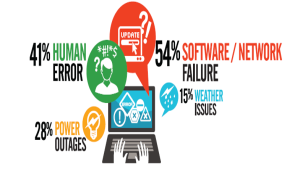It’s essential to plan thoroughly to protect yourself from the impact of potential crises – from fire, flood or theft to IT system failure, restricted access to premises or illness of key staff.
This planning is very important for small businesses since they often lack the resources to cope easily in a crisis.
Failure to plan could be disastrous. At best you risk losing customers while you’re getting your business back on its feet. At worst your business may never recover and may ultimately cease trading.
As part of the planning process you should:
- identify potential crises that might affect you
- determine how you intend to minimise the risks of these disasters occurring
- set out how you’ll react if a disaster occurs in a business continuity plan
- test the plan regularly
For example, if you’re reliant on computer information, you should put a back-up system in place so you have a copy of key data in the event of a system failure.
Benefits of a business continuity plan
A carefully thought-out business continuity plan will make coping in a crisis easier and enable you to minimise disruption to the business and its customers.
It will also prove to customers, insurers and investors that your business is robust enough to cope with anything that might be thrown at you – possibly giving you the edge over your competitors.
CRISIS THAT COULD AFFECT YOUR BUSINESS
Depending on your business’ specific circumstances, there are many possible events that might constitute a crisis:
- Natural disasters – for example, flooding caused by burst water pipes or heavy rain, or wind damage following storms.
- Theft or vandalism – theft of computer equipment, for instance, could prove devastating. Similarly, vandalism of machinery or vehicles could not only be costly but also pose health and safety risks.
- Fire – few other situations have such potential to physically destroy a business.
- Power – loss of power could have serious consequences. What would you do if you couldn’t use IT or telecoms systems or operate other key machinery or equipment?
- IT system failure – computer viruses, attacks by hackers or system failures could affect employees’ ability to work effectively.
- Restricted access to premises – how would your business function if you couldn’t access your workplace – for example, due to a gas leak?
- Loss or illness of key staff – if any of your staff is central to the running of your business, consider how you would cope if they were to leave or be incapacitated by illness.
- Outbreak of disease or infection – depending on your type of business an outbreak of an infectious disease among your staff, in your premises or among livestock could present serious health and safety risks.
- Terrorist attack – consider the risks to your employees and your business operations if there is a terrorist strike, either where your business is based or in locations to which you and your employees travel. Also consider whether an attack may have a longer-term effect on your particular market or sector.
- Crisis affecting suppliers – how would you source alternative supplies?
- Crisis affecting customers – will insurance or customer guarantees offset a client’s inability to take your goods or services?
- Crisis affecting your business’ reputation – how would you cope, for example, in the event of a product recall?
Though some of these scenarios may seem unlikely, it’s prudent to give them consideration.






 By Matt VanVoorhis
By Matt VanVoorhis
